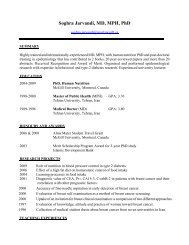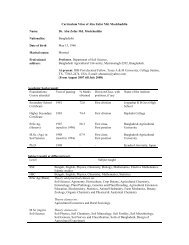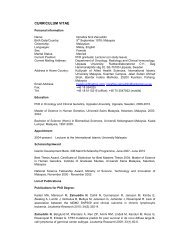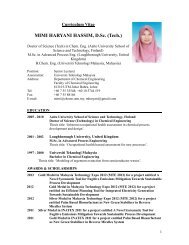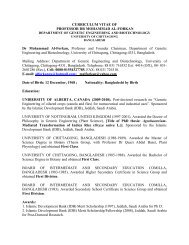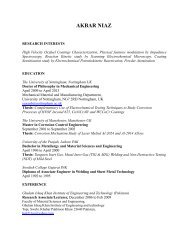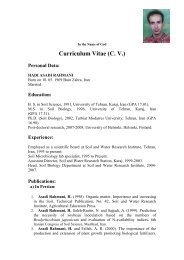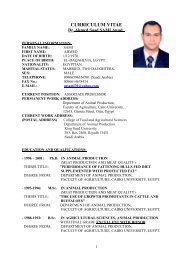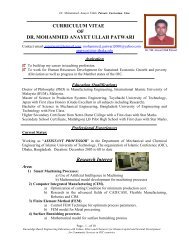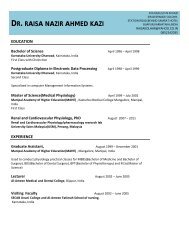Engineering: issues, challenges and opportunities for development ...
Engineering: issues, challenges and opportunities for development ...
Engineering: issues, challenges and opportunities for development ...
You also want an ePaper? Increase the reach of your titles
YUMPU automatically turns print PDFs into web optimized ePapers that Google loves.
ENGINEERING: ISSUES CHALLENGES AND OPPORTUNITIES FOR DEVELOPMENTtives, outside the company with local associations, st<strong>and</strong>ardorganizations, governmental agencies, parliamentary commissions,non-governmental organizations, <strong>and</strong> so on.Because of their position in the socio-technical system, engineersare expected to be citizens of technical democracy, morethan any other member of society. Moreover, concerning theirobligation within their companies or organizations, besidesthe role that consists of the communication of technical specifications,engineers can also (<strong>and</strong> must in certain cases) suggestalternatives to their superiors or their clients. Engineersare responsible because those who have to make the choicesplace trust in them.KnowledgeThe highly compartmentalized work situations of engineers<strong>and</strong> the labour division which characterizes the large corporationswhere they work, creates another risk-factor than just thedilution of responsibilities, such as the loss of direction <strong>and</strong> thenon-retention of aims, which can result in an accepted blindness<strong>for</strong> the actors involved. There is probably a moral obligation <strong>for</strong>engineers not to be ignorant, or worse, indifferent, to the goalsthey are working to achieve, a well as a necessity to be able toexpress their positions clearly towards attaining those goals.One cannot be held accountable <strong>for</strong> something about whichone is ignorant: this has been one of the foundations of thenotion of responsibility since ancient times. But there are ignorancesthat are more morally acceptable than others. Somepeople believe that the participation of engineers in decisionmakingis simply unknowable. Thus, their moral responsibilitywould be indescribable. If ethical decisions are difficult tomake <strong>for</strong> engineers, ethical judgements are always possible,<strong>and</strong> they can improve.PowerAnother reason put <strong>for</strong>th <strong>for</strong> saying that there is no room<strong>for</strong> ethics in engineering is based on the engineers’ status asemployees, which does not af<strong>for</strong>d them enough freedom. Thequestion of the engineers’ professional autonomy <strong>and</strong> of theirpower in decision-making in companies was studied by historians<strong>and</strong> sociologists who did not look at engineers as professionalsbut as workers. Although it is necessary to remindourselves that engineers are hardly independent professionalswe can wonder if their freedom of action within the organizationsthat employ them is as narrow as some theses on the‘proletarization’ of engineers seem to suggest.The reflections on the specificity of engineering, its impactson the social world <strong>and</strong> its hybrid nature, social as well astechnical, compel us to think of the place where the engineersexercise their power outside the most visible aspects, i.e. in thegames of relationship vis-à-vis authority. Engineers are close tothe ‘black box’ of technology; they are sometimes the principalactors of the closing of this box. But what we remember atthe end are the economic <strong>and</strong> political constraints. Engineersappear then as employees among others whose only socialresponsibility would be to obey their hierarchy. One of theengineers’ obligations may consist of, in extreme cases, blowingthe whistle <strong>and</strong> taking the risk to bypass their obligationof loyalty towards their employers. But another obligation,less spectacular maybe, would consist of engineers contributingto the improvement of the structures in which they act,to turn them into more fair <strong>and</strong> responsible institutions. Thispoint of view fits very well with Paul Ricoeur’s definition ofethics as an ‘aim of the good life with <strong>and</strong> <strong>for</strong> others in justinstitutions.’Conclusion<strong>Engineering</strong> ethics is a new field of contextualized ethics, farfrom maturity. For many years already, first in the USA, <strong>and</strong> nowin some European <strong>and</strong> Asian countries, engineering ethics hasstarted to interest a larger community of scholars. Its focus haswidened from the specific nature of engineering as a ‘true’ profession,to the relevant characteristics of engineering as an activityat the articulation of the social, the economic, the political <strong>and</strong>the technical. We need to focus on the <strong>challenges</strong> of research inengineering ethics <strong>and</strong> stress the interest in an epistemologicalapproach to the question, aiming at defining the outline of theactivity at the heart of engineering ethics: engineering.The most recent research works in engineering ethics alsoshow a greater underst<strong>and</strong>ing of the different scales in whichengineering may be questioned ethically: on the individualmicro-level, on the mezzo-level of a group, a professionalbody or a company, <strong>and</strong> on the macro-level of the planet.Some <strong>issues</strong> related to sustainable <strong>development</strong> <strong>and</strong> corporatesocial responsibility, now considered as a relevant matter<strong>for</strong> engineering ethics, can merge macro <strong>and</strong> mezzo levels.Most courses in engineering ethics have long offered studyingthe ethical dilemmas that students could encounter intheir careers. Although this approach is interesting <strong>and</strong> useful,numerous other entries can contribute to broaden the individualresponsibility <strong>and</strong> ethical sensitivity of future engineers.4.6.2 <strong>Engineering</strong> ethics: furtherdiscussionMonique FrizeTo be ethical <strong>and</strong> professional are terms that are synonymouswith being an engineer. Unlike most science, the work of engineersfrequently directly affects public safety <strong>and</strong> health <strong>and</strong>can influence business <strong>and</strong> even politics. The engineering professionin some countries is self-regulated, which means that itis governed by its own association of engineers. In order to jointhis association, engineers who apply are screened <strong>for</strong> compe-186




